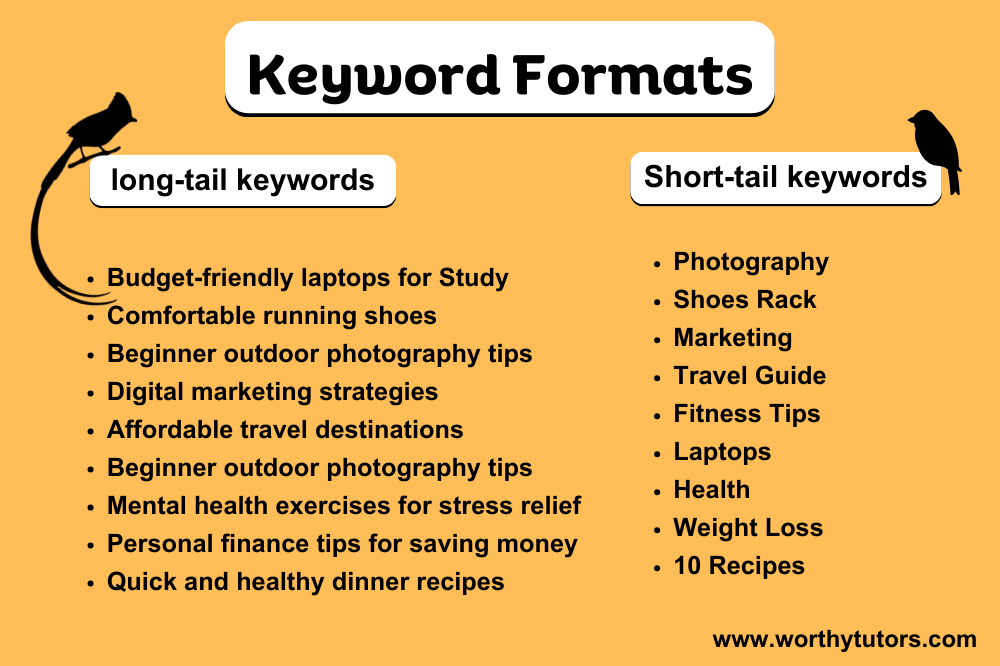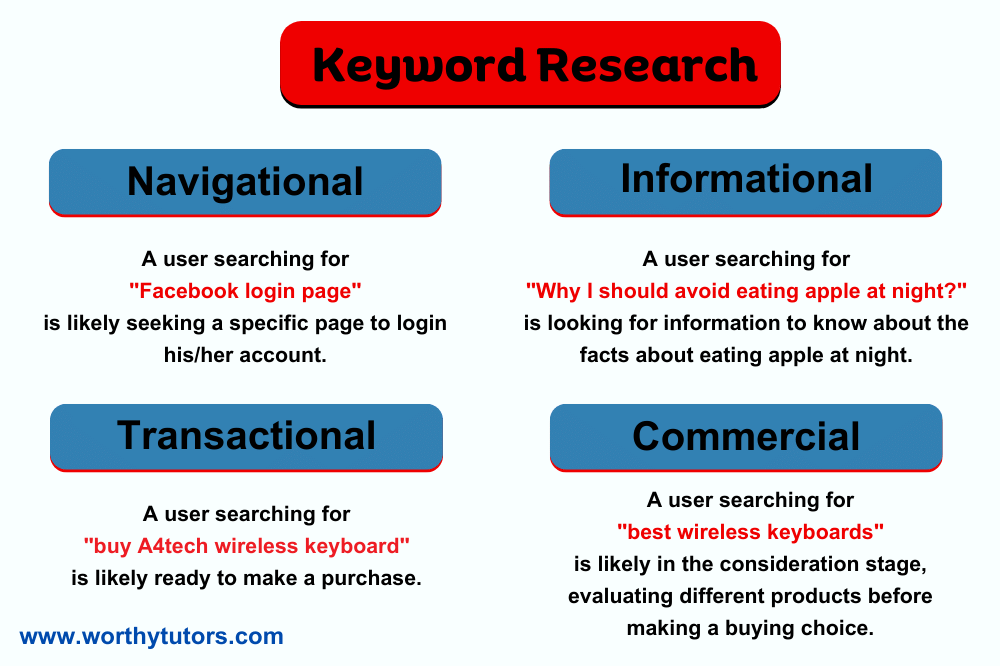
What Does Keyword Research Mean in Blogging?
All the bloggers and content writers are well familiarized with the term ‘Keyword’. While some new learners need a brief explanation for the term ‘keyword’ or ‘Keyword Research’. In blogging and content writing, “keyword research” is a process of discovering, placing and optimizing a specific word, a term, a phrase, or a sentence inside blog or article that users are likely to enter search engines. This process involves understanding multiple factors ranging from audience’s search behavior to search engines algorithm for providing SERPs.
Why Keyword Research Is Important?
There are over two billion websites that provide information to the visitors through different search engines. According to Neil Patel’s statement, about 4.6 billion sheet are published on Google Search Engine. Hardly 10% pages receive organic clicks. These 10% content belongs to those who do keyword research.
Keyword research holds vital importance as search engines heavily rely on it to determine the relevance of content to user queries. By strategically placing well-researched keywords, you increase the likelihood of your content ranking higher on Search Engine Results Pages (SERPs). Thus your content reaches to a broader and more targeted audience. Optimizing your blog content with your researched keywords can help Google extract the most relevant information to answer a searcher’s query.
Keyword Formats
We divide keywords into two formats: Short-tail keywords and long-tail keywords.

Short-tail Keywords: These are brief and general terms. They often have high search volume but are highly competitive. Useful for broad brand visibility but may not convert as well because of their generality.
Examples: shoes, digital marketing, hunting, running shoes, dog foods, etc.
Long-Tail Keywords: Long-tail keywords consist of three or more words. It includes more specific phrases that cater to a niche audience. Long-tail keywords have lower search volume but are often easier to rank for. These are effective for targeting a specific audience and capturing more qualified leads.
Examples: “best running shoes for flat feet,” “digital marketing strategies for small businesses.”
Types of Keyword Based on Searchers Intent
Understanding the various types of keywords based on user search intent is pivotal for effective digital marketing strategies. Analyzing and aligning with search intent is a fundamental aspect of keyword research. Traditionally, four primary types of search intent are identified:

1. Navigational Intent:
Navigational intent refers to user searches where individuals are specifically looking for a particular webpage, brand, or website. Navigational keywords serve to streamline user navigation by providing direct access to the desired destination, enhancing brand visibility, and ensuring users find the exact information they are looking for.
Example: A user searching for ” Facebook login page” is likely seeking a specific page to login his/her account.
2. Informational Intent:
Informational intent involves users seeking general knowledge or information on a particular topic. Content created for informational keywords aims to educate, inform, or provide insights, catering to users who are in the discovery phase and seeking answers to their queries.
Example: A user searching “Why I should avoid eating apple at night?” is looking for information to know about the facts about eating apple at night.
3. Commercial Intent:
Commercial intent is observed when users are in the research phase, exploring various options before making a purchase decision. Keywords with commercial intent play a crucial role in influencing user decisions by offering product comparisons, reviews, and information that aids in the decision-making process.
Example: A user searching for “best wireless keyboard” is likely in the consideration stage, evaluating different products before making a buying choice.
4. Transactional Intent:
Transactional intent is evident when users actively search with the intention of making a direct purchase of a specific product or brand. Transactional keywords are instrumental in capturing users at the point of conversion, guiding them towards a direct purchase, and are particularly significant for e-commerce and businesses focused on immediate sales.
Example: A user searching for “buy A4tech wireless keyboard” is likely ready to make a purchase.
Know About Basic Terms related to Keyword Research
Here are few terms and elements that you must know while performing a keyword research on a topic.
Search Volume:
Search volume means how many times user search for a specific keyword. Higher search volume indicates that more people are making searches on this keyword. If search volume is high, it may also mean there is more competition on that keyword.
Authority:
Keyword authority is influenced by the credibility and trustworthiness of websites using those keywords. Google will provide more weight to a keyword if authoritative websites (having high DA/PA) are using it in their content and has high search volume. That means you must do all you can to become an authoritative source by increasing page authority with exceptional content and getting backlinks from authoritative sources.
Keyword Difficulty:
This metric judges the level of competition for a particular keyword. It means how hard it will be to rank for a keyword on the first page of any search engine. Keyword difficulty is measured between 0 to 100. The higher the number, the harder it will be to rank. Selecting keywords with a balanced difficulty level improves your chances of ranking higher.
Relevance:
Relevance is a key factor in choosing keywords because Google ranks content for relevance. Ensure that your selected keywords align closely with the content of your blog or website. Do not perform research on a keyword that does not belong to your blog niche.
Keyword CPC (Cost-Per-Click):
CPC is a term that belongs to monetization through Google ads. Understanding the Cost-Per-Click helps identify the commercial value of a specific keyword. CPC represents how many advertisers are trying to place ads for that specific keyword. The higher the CPC rate, the more difficult it will be for a keyword to rank.
Related Research Terms:
Once you have researched a keyword for your blog, see related terms of that keyword. If you have searched on a keyword rent a flat, you may add rent an apartment.
Keyword Spelling Variants:
There are different varieties in English and you can see variation in spelling for some terms. You can optimize your content on keyword spelling variants to rank it better. Taking into account variations in spelling ensures that your content caters to a wider audience, accommodating different search preferences.
Short Keyword vs. Long Tail Keyword:
While short keywords are concise, they often face higher competition with high search volume. Long-tail keywords, on the other hand, are more specific and can attract a targeted audience with lower competition.
Useful Keyword Research Tips and Tricks
Here are useful tips and guidelines for doing keyword research.
1. Identify a Right Topic for Your Content:
Begin your content creation process by carefully selecting a topic that aligns with your audience’s interests and current industry trends. Choosing a relevant and engaging subject ensures that your content holds value and captivates your readers. Try to cover a universal topic that remain a point of interest in public for a long time. Do not opt seasonal or temporary keywords.
2. Discover Your Keyword from the Topic/Title/H1:
Extract a primary keyword from your chosen topic, title, or heading (H1 tag). This keyword should concisely summarize the main theme of your content, providing a clear focus for your writing. If your keyword reflects the theme of your title, it may rank higher quickly.
3. Make a List of Different Keywords:
Generate a comprehensive list of diverse keywords related to your chosen topic. Consider variations, synonyms, and terms that your target audience might use when searching for content similar to yours. You can take different ideas from Google SERP page by inserting your keyword in Google search bar.
4. Search for Similar Phrases and Synonyms:
Broaden the scope of your keyword list by exploring similar phrases and synonyms. This strategy enhances the discoverability of your content in search engines, capturing a wider audience.
5. Compile a Long-Tail Keyword Using Similar Phrases and Synonyms:
Construct a long-tail keyword by combining similar phrases and synonyms. Long-tail keywords add specificity to your content, attracting a more targeted audience interested in your niche.
6. See Your Competitors:
Analyze competitors within your niche to identify the keywords they are targeting. This valuable insight helps you understand your competitive landscape and discover potential keywords for your content.
7. Know Your Audience:
Gain a deep understanding of your target audience’s preferences and language. Understanding the language and preferences of your target audience enables you to choose keywords that resonate with them. Different keywords perform differently depending on various cultures and regions. You should be well familiar with your audience and their interests when making a research.
8. Remain in Your Blog Niche:
Maintain consistency within your blog’s niche. Focusing on a specific niche helps build authority, attracts a dedicated audience, and improves overall visibility for your website. Staying within your blog’s niche ensures that your selected keywords align with your overall content strategy, maintaining relevance. If your blog is on health niche, do not write on pet foods.
9. Analyze Your Topic on Google Trends:
Leverage Google Trends to assess the popularity and relevance of your chosen topic. Understanding trends can inform you about peak interest periods, allowing you to time your content for maximum impact.
Keyword Research Tools
In the world of keyword research, various tools can significantly aid your efforts. These tools provide valuable insights into search volumes, competition, and related keywords, empowering you to make informed decisions. Here are some notable tools:
Google Keyword Planner: A free tool by Google, the Keyword Planner helps you discover relevant keywords, estimate their search volumes, and assess their competitiveness.
Ahrefs: A comprehensive SEO tool, Ahrefs offers features like keyword research, backlink analysis, and site audit, providing a holistic view of your online presence.
MOZ: MOZ provides valuable insights into keyword difficulty, search volume, and potential opportunities, assisting you in refining your keyword strategy.
SEMrush: SEMrush is a versatile tool that covers various aspects of online visibility, including keyword research, competitor analysis, and site audits.
Ubersuggest: Ubersuggest, developed by Neil Patel, offers keyword ideas, content suggestions, and competitor analysis to enhance your overall SEO strategy.
The Bottom Line
In conclusion, learning keyword research strategy is fundamental for bloggers and website owners alike. By comprehending the significance of keywords, exploring essential elements, implementing practical tips, and leveraging powerful tools, you can optimize your content for better search engine visibility. Remember, effective keyword research is an ongoing process that evolves with your audience and industry trends. Stay proactive, adapt to changes, and watch your online presence flourish.
Learn Content Writing, Blogging, & SEO
Introduction to Blogging
How to Start Blogging
Scope of Content Writing
Different Forms of Content Writing
Types of SEO
Keyword Research Strategies
Blogging & Content Writing Terms
How to Make Title of a Blog Post?
How to Improve Readability Score?
Heading Structure of a Blog Post